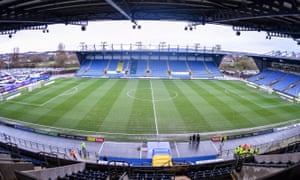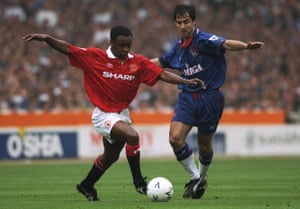Which footballers won the highest percentage of caps at World Cups? | The Knowledge | Football
“I was reading Gabriel Paletta’s Wikipedia page and noticed that he made his competitive international debut against England in World Cup 2014,” notes James Cranford. “He only made three appearances for Italy, meaning 33% of his senior international caps were World Cup games. Seven of Toto Schillaci’s 16 caps came in World Cup games (44%): does anyone have a higher percentage?”
Leaving one-cap wonders to one side, Rob Stevenson has more from 1990. “I went poking around other squads in that World Cup for a candidate, and eventually dug this up. Robert Fleck played four times for Scotland, and two of those appearances were in the 1990 World Cup,” he writes. Another 50% record is suggested by Chai from Atlanta: “Spain’s Albert Celades played four international matches, of which two were substitute appearances at the 1998 World Cup.”
For absolute top-tier international completism, however, Daibhi O’Leary takes us back to the very first tournament, in 1930. He explains: “The obvious example is Guillermo Stábile,” whose four internationals all came in those finals, giving him a 100% record. “He made his debut in Argentina’s second game (he only got in the side because the top scorer in their domestic league pulled out, apparently due to nerves) and won his fourth cap in the final; his performances won him both the inaugural Golden Boot (eight goals, scoring in every game) and a transfer to Genoa. That move and, later, injuries ended his international career. He then became arguably greater as a manager.”
Ben Wallace and Paul Peters both came up with another 100%er in Laurie Hughes, from England’s ill-fated 1950 campaign. “All of Hughes’s England caps came in the 1950 World Cup,” writes Ben. “He made his debut in the 2-0 win against Chile, played in the infamous loss against the USA and his final appearance came in a 2-0 defeat to Spain.” Any more to report?
(Still) under construction
“What is the longest time it has taken a club to complete a new stand?” wonders Rob Fielding.
“I imagine Oxford United’s Kassam Stadium will beat Port Vale’s 22-year wait for a finished stand. Currently at 19 years with a missing end,” writes James Pollard, while David Calboutin recalls some lengthy inactivity in the north-east. “Newcastle demolished The Leazes End in 1978 as part of a big plan to redevelop the ground. Unfortunately we were relegated and rebuilding was shelved until 1993, leaving a temporary terrace for 15 years, when the new stand was eventually built.”

Defunct sponsors
“Which teams have been sponsored by products that don’t exist any more and which team has been sponsored by the most defunct products?” muses Noble Francis.
We thought this sounded familiar. But there are earlier instances. Gareth Vaughan goes back to the 1980s: “I recall being told that West Brom were sponsored in 1984-85 by a public health warning to stop smoking. Given smoking is now prohibited in most work and internal public places, I wondered if this fits this description?” Meanwhile, Richard Young adds: “Northern Rock at Newcastle United … Hopefully shortly also Mike Ashley, on several levels.”
Chelsea started the Premier League era bearing the logo of a sadly departed company on their chests, writes Stuart Goodwin. “Unbelievably to many who remember their computing heyday with the C64 and Amiga, but Commodore went out of business within 12 months of the completion of Premier League season v1.0,” he notes. “Commodore International’s demise in April 1994 also meant that Chelsea took the pitch for the following month’s FA Cup final wearing the badge of a company that no longer existed. In a similar vein, Crystal Palace went into the Premier League era sponsored by Tulip Computers – the Dutch company went under in 2009.”

Knowledge archive
“In 2011, I heard rumours about the owner of American wrestling company WWE, Vince McMahon, trying to buy Newcastle United,” mailed Morten Hansen in January 2014. “Is this true?”
It’s hard to tell where the rumour linking Vince McMahon, CEO and chairman of WWE, with Newcastle came from, but it didn’t take long to spread all over Twitter and start to creep in to the football news consciousness. The Newcastle Chronicle duly put the question to the club, but the official response was to brand the story “nonsense” and refuse to comment further. So the whole thing died almost as quickly as it had sprung in to life. And really, it’s difficult to see how a rumour linking Sensible Mike’s club with the man in charge of this sort of pantomime can ever have gained any traction.
Can you help?
As an adjunct to the question on defunct sponsors, Simon Bradley asks: “Who are the most successful shirt sponsors, in terms of honours won? Of course, this is an inexact science, as determining the comparative value of different trophies is highly debatable. But off the top of my head: Sharp must be up there, having sponsored Manchester United during their 90s glory days; Carling cleaned up pretty much every trophy going in Scotland by sponsoring both Old Firm teams between 2003 and 2010; and Emirates Airline have four Champions Leagues with Real Madrid, as well as surely a clutch of other honours from various deals across Europe.”
“Which professional club has the longest-standing record transfer purchase fee?” wonders Dan Weaver. “My guess is my club Wrexham with Joey Jones, when we were buying players from the European Cup holders, for £220,000 back in 1978.”
“Who were the last father and son combination to play in the same team in the Football League?” mails George Read.
“Wolves’ Europa League shirt is inspired by the traditional Mexican national team jersey, associated with our record signing Raúl Jiménez,” writes Miles Johnson. “Are there any other instances where a club has released a kit to honour a national team or nation itself? Didn’t Crystal Palace once have a Brazil national team-inspired away kit or something?”
“What is the record number of consecutive successful penalties in shootouts in the same type of competition?” asks Richard Askham. “Huddersfield obviously hold the record in Football League play-offs, with 12 (and also the next best with 11). I suspect that Germany in World Cups and Euros will have an unbeatable record and I remember Ivory Coast scoring 12 or more in an Africa Cup of Nations shoot-out.”
Dempanic
(@Loizeus)Any instances of the manager of the month not being in charge of their team’s every game in that month?
“Who is the shortest goalkeeper to play in either the old First Division or the Premier League? My guess it was Laurie Sivell who kept goal for Ipswich Town in the 70s,” writes Mitch Mitchell.
